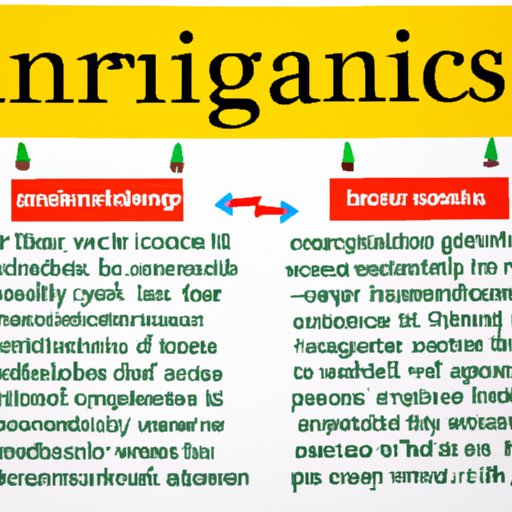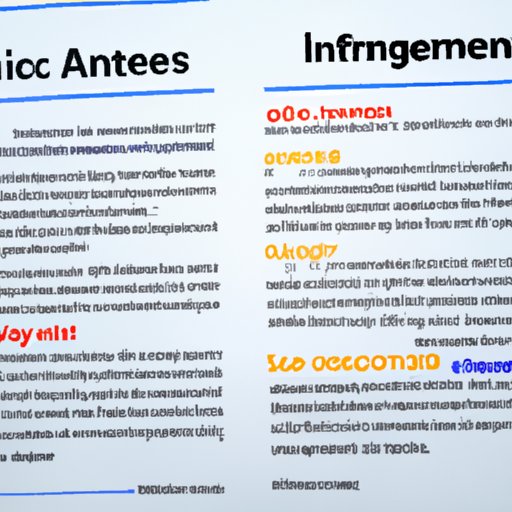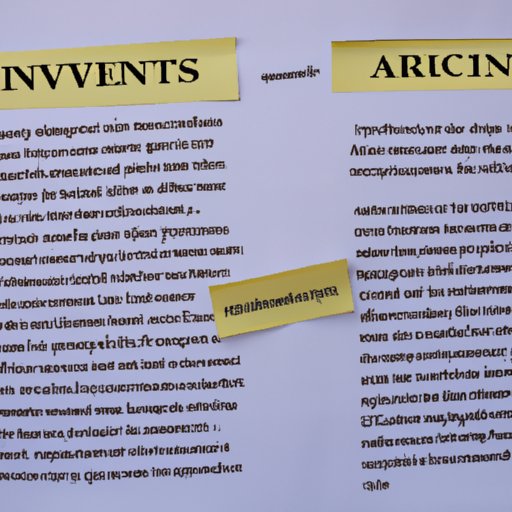Introduction
Informational and argumentative writing are two different types of compositions that share a number of similarities. The purpose of both types of writing is to present information in an organized and persuasive manner, but each type of writing uses different techniques to achieve this goal. In this article, we will explore how these two types of writing are similar, and how understanding their shared qualities can help readers better approach similar problems.

Analyzing the Commonalities between Informational and Argumentative Writing
The purpose of both informational and argumentative writing is to present information in an organized and persuasive manner. Both types of writing make use of evidence, structure, and logical reasoning to support a point or argument. However, the way each type of writing is structured and organized differs.
Purpose of both types of writing
Informational writing is used to explain a topic in a straightforward and objective manner. The goal of this type of writing is to provide the reader with facts and figures without the writer’s opinion influencing the content. On the other hand, argumentative writing is used to persuade the reader to take a particular stance on an issue. It is written from the perspective of the writer and seeks to convince the reader to agree with the writer’s point of view.
Structure and organization
Informational writing typically follows a linear structure, starting with an introduction, followed by body paragraphs that discuss the main points, and ending with a conclusion. Argumentative writing, on the other hand, is more flexible and often includes counterarguments and rebuttals. This type of writing also allows for more creativity in terms of structure and organization.
Use of evidence
Both types of writing rely heavily on evidence to support their argument. In informational writing, the evidence must be factual and reliable, while in argumentative writing, the evidence must be persuasive and convincing. Evidence is used to back up a claim or point, and should be used to strengthen the overall argument of the piece.
Exploring the Shared Features of Informational and Argumentative Writing
In addition to the similarities in purpose, structure, and use of evidence, there are also a number of shared features between informational and argumentative writing. These shared features include tone and language, the use of rhetorical strategies, and the evaluation of sources.
Similarities in tone and language
The tone and language of both types of writing should be clear, concise, and easy to understand. Informational writing should be objective, while argumentative writing should be persuasive. The language used should be appropriate for the intended audience, and should be free of bias or personal opinions.
Use of rhetorical strategies
Both informational and argumentative writing make use of rhetorical strategies to engage the reader and enhance the overall argument. These strategies include the use of analogies, metaphors, and other figurative language. They can also include the use of repetition, parallelism, and other devices to emphasize key points.
Evaluation of sources
Both types of writing require the evaluation of sources to ensure accuracy and credibility. Sources should be evaluated for relevance, authority, accuracy, currency, and objectivity. Evaluating sources helps to ensure that the information presented is reliable and trustworthy.

Comparing the Similarities between Informational and Argumentative Writing
When comparing the similarities between informational and argumentative writing, it is important to note that both types of writing require evidence to support a point. Both types of writing also require clear, concise language to convey the message effectively. Additionally, both types of writing use logical arguments to make a point and engage the reader.

Investigating the Connections between Informational and Argumentative Writing
In order to effectively write either type of composition, it is important to understand the audience. Understanding the audience helps the writer to tailor the language and content to best suit the intended readership. Additionally, both types of writing make use of claims to back up an argument. Claims should be supported by evidence, and should be logically sound and well-reasoned. Finally, both types of writing should end with an effective conclusion that summarizes the main points and emphasizes the overall argument.
Examining the Parallels between Informational and Argumentative Writing
When examining the parallels between informational and argumentative writing, it is important to consider the similarities in summarizing the main points. Both types of writing should include a summary of the main points and arguments made throughout the composition. Additionally, both types of writing should be persuasive and make sure the writing is convincing. Finally, both types of writing should identify counterarguments and address them effectively.
Conclusion
In conclusion, informational and argumentative writing share a number of similarities, including purpose, structure, use of evidence, tone, language, and rhetorical strategies. Understanding the commonalities between these two types of writing can help readers better approach similar problems. By remembering to follow the guidelines outlined in this article, readers can craft effective pieces of writing that are both informative and persuasive.
(Note: Is this article not meeting your expectations? Do you have knowledge or insights to share? Unlock new opportunities and expand your reach by joining our authors team. Click Registration to join us and share your expertise with our readers.)
